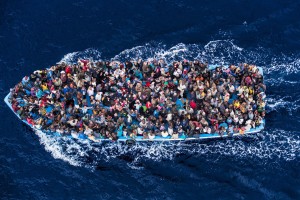Global refugee crisis – by the numbers
As 2015 draws to an end, world leaders are locked in intractable debates over how to react to a spiraling global migration emergency and all of the humanitarian issues it is creating.
There has been a significant jump in first-time asylum seekers entering the European Union, as refugees fleeing from Syria, Iraq, Afghanistan, and other North African countries undertake long and perilous journeys across the Mediterranean Sea. So far thousands have died along the way.

There are 60 million displaced people in the world
Using key numbers, here is an analysis of the events that turned 2015 into the year of the refugee:
60 million: The number of displaced people in the world.
One in every 122 people on Earth has been forced to flee their home; a ratio worse even than at the end of WWII. At least five million people were forcibly displaced from their homes in the first half of the year, adding to the 59.5 million displaced people the United Nations High Commission for Refugees (UNHCR) had recorded by the end of 2014.
Most of the people on the move in 2015 were displaced within their own country, but as many 839,000 people fled across international borders in the first half of the year, more than a third of them trying to escape the war in Syria.
One million: The number of refugees entering the European Union through the Mediterranean Sea.
In terms of numbers, the flow of refugees into Europe in 2015 was more than four times the number recorded in 2014. The UNHCR has provided aid to 40 sites in Greece, though it is still looking to fund an additional $US96.1 million “to support Croatia, Greece, Serbia, Slovenia and Macedonia, bringing the total amount that it is trying to raise for Europe’s biggest refugee crisis since World War Two to $172.7 million. The funds will be used to winter-proof shelter and facilities and to supply family tents.
2,500: The average daily number of refugees passing through the Greek island of Lesbos.
Among the asylum seekers crossing the Aegean Sea to pass through the Greek islands, about 59 percent, or 466,856 people, arrived in the Greek island of Lesbos in 2015. The island is about five miles from the Turkish coast where refugees and migrants arrive after hours on rubber dinghies.
The trip to Europe is a deadly one. As of mid-December, the total known number of fatalities or those who went missing on the Mediterranean Sea stood at 3,671.
800: The number of people who died on one capsized boat.
This year saw more than 800 people drown in a single migrant boat that capsized off the coast of Libya in April, the majority of whom were locked in the hull. Many were Syrians, Eritreans, and Somalians. In a similar incident, another 200 people drowned off the coast of Libya in August when their fishing boat capsized.
Three: The age of the drowned Syrian boy whose photo rocked the world.
The world woke up collectively to the refugee crisis in September, when Aylan Kurdi, a three-year-old Syrian refugee, washed up onshore as he and his family made their way across the Aegean Sea. The photo of Aylan’s body had and immediate effect on the way that media outlets covered the refugee crisis. Shortly afterwards, the Australian Government announced it would take extra refugees from the Syrian conflict.
One million: The number of asylum applications that Germany expects to receive.
Germany is set to accept one million asylum applications in 2015. In August Chancellor Angela Merkel announced that Syrians could apply for asylum in her country and that they wouldn’t be sent back to their countries. Germany is thus far the largest recipient of asylum applications, followed by France, Sweden, Italy, and the United Kingdom. Time Magazine named Merkel as its “Person of the Year”.
12,000: The number of extra refugees from the Syrian conflict the Australia Government has agreed to take.
In September, the then Prime Minister Tony Abbott said Australia would permanently resettle 12,000 refugees from Syria, and begin air strikes on Islamic State targets. Mr Abbott described the commitment to take in 12,000 refugees as one of the world’s largest to date.
He said Australia would “move quickly” to resettle refugees but they would be subject to standard security checks. The government also committed to spending $44 million supplying 240,000 refugees with cash, food, water and blankets in Lebanon, Turkey, and Jordan.
Laurie Nowell
AMES Australia Senior Journalist












